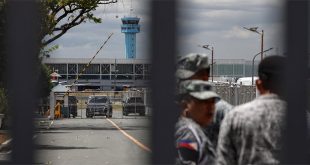
Washington, United States | AFP | The US seized a North Korean freighter in a further escalation of tensions Thursday after Pyongyang fired what was believed to be two missiles and President Donald Trump said Kim Jong Un was not ready to negotiate denuclearisation.
The launch of the projectiles — identified as short-range missiles by the South Korea military — came as a US envoy visited Seoul, across one of the world’s most heavily militarised borders.
It was Pyongyang’s second launch in less than a week as it seeks to up the ante in deadlocked nuclear negotiations with Washington.
In New York, federal authorities said a North Korean freighter had been seized on grounds of violating UN sanctions imposed over its nuclear program.
The officials said Wise Honest — an 18,000-ton, single hull bulk carrier — had exported high-grade coal and brought back machinery to the impoverished and reclusive country.
During an event at the White House, Trump said US authorities were looking at the latest projectile launches “very seriously.”
“They were smaller missiles, short range missiles. Nobody’s happy about it,” Trump told reporters.
“The relationship continues. But we’ll see what happens. I know they want to negotiate, they’re talking about negotiating. But I don’t think they are ready to negotiate.”
Two Trump-Kim summits, the most recent in Vietnam in February, have produced no tangible progress toward persuading North Korea to give up its nuclear weapons.
Thursday’s missile firing came after North Korea carried out a military drill and fired multiple projectiles on Saturday, with at least one believed to be a short-range missile.
– ‘An element of protest’ –
The North had not previously fired a missile since November 2017, shortly before a rapid diplomatic thaw eased high tensions on the peninsula and paved the way for a historic first meeting between Kim and Trump.
But the summit in Vietnam broke up without an agreement rolling back Pyongyang’s nuclear programme in exchange for sanctions relief or even a joint statement, leaving the North frustrated.
Thursday’s launch came hours after the US Special Representative on North Korea, Stephen Biegun, arrived in Seoul for talks with South Korean officials, in his first visit since the Hanoi summit.
South Korean President Moon Jae-in said Pyongyang’s latest move had “an element of protest and is a pressuring action to steer the nuclear talks in a direction it desires”.
“It appears the North is highly displeased that the Hanoi summit ended without agreement,” he said in an interview marking his first two years in office.
But he added: “Whatever North Korea’s intentions might have been, we warn that it could make negotiations more difficult.”
The North “fired what appeared to be two short-range missiles” from Kusong in North Pyongan province, Seoul’s Joint Chiefs of Staff (JCS) said in a statement, updating its earlier assessment that the launch was from Sino-ri in the same province.
The JCS added the missiles flew eastwards for 270 and 420 kilometres (170 and 260 miles) and the South Korean and US militaries were jointly analysing them.
Biegun met his South Korean counterpart Lee Do-hoon for breakfast on Thursday and is due to hold discussions with the South’s foreign and unification ministers Friday as the security allies — Washington stations 28,500 troops in the South to defend it from its neighbour — work on their approach towards Pyongyang.
With Thursday’s launch, said Hong Min, a senior researcher at the state-run Korea Institute for National Unification, “North Korea is sending a clear message that it will not be satisfied with humanitarian aid” being considered by Seoul.
– ‘Flying objects’ –
“It is saying, ‘We want security guarantees in return for the denuclearisation process’,” he added.
Pyongyang, Seoul and Washington had all refrained from explicitly calling Saturday’s launch a missile — the South used the term “projectile” — which could jeopardise the ongoing diplomacy if it violated UN Security Council resolutions against ballistic technology as well as Kim’s announcement of an end to long-range missile tests.
Experts said at least one short-range ballistic missile was involved on Saturday, with a report on the respected 38 North website saying debris left by the launch suggested it was a “direct import” of a Russian-produced Iskander.
If North Korea had imported Iskanders from Russia, the report added, “it has an existing capacity to deliver warheads to targets in South Korea with great precision”.
A summit between Moon and Kim a year ago was instrumental in lowering the temperature, but since the Hanoi summit the North has blamed Seoul for siding with Washington, leaving inter-Korean relations in limbo.
 The Independent Uganda: You get the Truth we Pay the Price
The Independent Uganda: You get the Truth we Pay the Price


